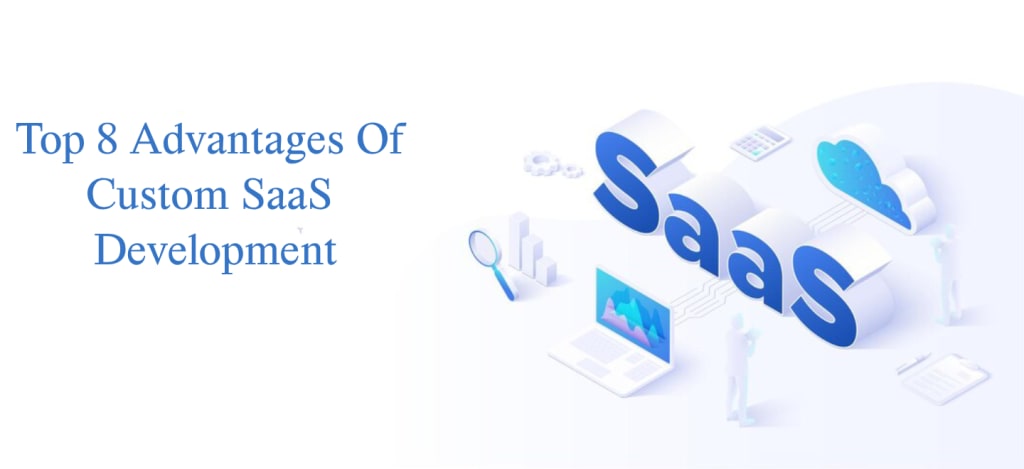Top 8 Advantages Of Custom SaaS Development
SaaS provides businesses with an alternative method for installing software.

SaaS provides businesses with an alternative method for installing software, which involves the traditional installation process involving the app and server installation and configuration. Instead, SaaS applications will be hosted on cloud networks where API or web interface access allows access; your company may then use SaaS software on an as-needed basis for an agreed-upon time; you will pay accordingly but have many benefits.
Technology and business models change at an astoundingly rapid rate; therefore, it is vitally important that business owners consider long-term effects when selecting software products. Furthermore, business owners need a product that allows maximum adaptability to remain current in their industries and remain competitive.
Software as a Service (SaaS) is an approach to application distribution that uses cloud service providers as hosts to host applications on an Internet-accessible server and make them readily available to end-users via the network.
SaaS has experienced remarkable growth over the past decade. Much of its outsourcing SaaS development and rapid development can be found outside the IT sector, with cloud technology now rapidly taking shape across many fields - including design CAD and PML apps that can now compete directly against their on-premise equivalents.
SaaS (Software as a Service) has quickly become one of the hottest trends in enterprise software, making headlines everywhere, from IT forums to technology magazines. SaaS allows businesses to deliver software within an agreed-upon budget; cloud computing (or SaaS or cloud computing) offers complete support to maximize costs and flexibility within your operations.
SaaS works on Subscription Model -In 2023, it is projected to grow to an astounding 208.1 billion dollars. If you have not taken part already in this revolutionary technology, now would be an excellent time to join.
What Is Software As A Service?
Software as a Service (SaaS) refers to an on-demand and cloud-based suite of applications provided to end users and licensed through subscription models that deliver them directly through an internet browser.
With SaaS development encompassing design, testing, launch, maintenance, and performance security scaling capacity testing, SaaS offers businesses many benefits when considering how best to license its applications for their users. An effective SaaS provider has proven their worth in creating successful applications across industries like:
- Apps for Mobile Devices and Software Solutions for HR Management.
- Software solutions designed specifically to accommodate payroll and accounting.
- Software for resource planning.
- Performance Tracker software: CRM.
Two important features distinguish SaaS from on-premises software:
Software as a Service (SaaS) is a cloud service - Deploying SaaS requires no extensive hardware setup, and the vendors offer assistance when troubleshooting is needed; no IT company needs to install and manage this type of application on behalf of their client.
SaaS works on Subscription Model - SaaS offers an easy subscription model with monthly/annual costs that cover software licensing, support and any associated additional expenses. This differs significantly from on-premise software licenses, which typically last forever and must be purchased as perpetual licenses.
SaaS offers you some advantages over abandoning the traditional software on-premise models. You will understand its significance the better you are informed.
SaaS Platform Vs On-Premise Software: What Are The Differences?
Traditional software applications must be purchased with a usage license that must be paid upfront in full; usually, this allows only for one device or user at any one time, regardless of whether bundled with other purchases or purchased individually. Users typically incur high installation and usage fees to install such traditional apps onto devices. They must purchase and install these licenses individually at full price upfront.
SaaS companies allow businesses to utilize an application on an ongoing basis - for instance, monthly or annually - instead of paying large licensing fees upfront. One key advantage to SaaS over other software delivery methods is users can cancel subscriptions when no longer needed, saving significant licensing costs in comparison with traditional methods of software distribution.
SaaS protects both users and companies from becoming mired in long-term contracts by being cloud-based; updates for apps can be performed remotely, saving both businesses and users money by not needing to update each computer separately.
SaaS offers significant advantages to businesses that use it, compared with the more conventional software purchase model. As cloud computing becomes an integral component of software companies' offerings, more SaaS services have emerged, providing significant benefits. The following section explores eight of these advantages of SaaS services.
The Top 8 Major Advantages Of Custom SaaS Development
Many small and large organizations have taken on automated business models as an approach. These eight major advantages will make you hire SaaS developers for developing a SaaS application for your business processes.
Easy Customization
SaaS applications have gained great renown for being easily customizable, which explains their widespread acceptance. Learn why. SaaS offers virtually limitless customization opportunities, offering software and apps tailored specifically to match the design of your business.
SaaS (software as a service) enables users to customize and access applications online from any location and request upgrades or specifications - with access from anywhere possible via their system itself.
No Additional Hardware Costs
Small businesses face expensive expenses when investing in physical equipment and software. SaaS allows businesses to purchase top-of-the-line software without incurring the associated hardware expenses; your cloud provider will take care of maintaining and running it, so there won't be an initial setup fee or fees to pay out for the initial setup of an app. Updating and maintaining applications is another ongoing expense that can be managed via cloud storage services.
Multitenant Architecture
SaaS allows customers to personalize their app while remaining limited in modifying its code. Vendors sell it using a multitenant architecture with multiple tenants for each SaaS user account. Multiple users can collaborate in sharing databases and resources within one shared system, saving time and money as the vendor will handle any necessary updates to hardware or related applications. Multitenant architecture can appeal to tenants because it gives them affordable access to the latest software updates and upgrades.
Better Global Access
Certain software installations are limited to one computer or IP, which could become problematic when moving countries, hiring foreign staff members, traveling for business, or moving or relocating your company. SaaS allows users to access the software anywhere with Internet connectivity, helping businesses increase productivity while decreasing staff cuts. An established code will facilitate project collaboration without creating technical obstacles or delays.
Cross-Device Compatible
SaaS software does not restrict users to one device or place. Anybody, no matter their device of choice (computer, laptop, tablet or smartphone), can access and use this type of service - software compatibility ensures an enjoyable user experience. Software developers face an uphill struggle when designing code across various platforms; unfortunately, app developers often don't understand this aspect of SaaS.
App Integration
The application Programming Interface (API) interfaces clients, apps and servers. A client refers to any data users enter into an app through input devices like keyboards. SaaS provides users an effective means to easily integrate their business model with SaaS vendors - one of its key advantages. Advanced APIs enable vendor and user servers to connect easily with one another's interfaces without experiencing errors or making miscalculations.
Flexible Payments & Scalability
As SaaS is a web-based software, its features can easily be modified to meet your business's requirements. Updates make the system more sophisticated while decreasing data loss through automated backup and patch processes - giving your company flexibility over how you scale or reduce SaaS as necessary.
SaaS offers more flexibility when it comes to paying than traditional software licenses that cost hundreds of dollars and must be renewed each year, unlike SaaS, where expensive, lifetime licenses must be bought upfront and may only ever be needed occasionally. When extra storage space is required, you can buy it via the cloud; any unnecessary subscriptions for features you no longer require can also be canceled.
Ease Of Management
Traditional software solutions often take weeks or days to address problems; with SaaS services, however, both consumer and vendor are bound by Service Level Agreements, which define each party's responsibilities and roles in solving them quickly.
The document also details the turnaround time to answer questions and deliver correct responses; provides legal protection to clients; ensures accountability; prevents workflow/productivity compromise due to software issues. SaaS apps bring many advantages; in addition to those mentioned, flawless updates, guaranteed security measures, and long-term client relationships are significant draws.
Are You Ready To Use A SaaS Platform For Your Business?
Cloud computing may or may not work well for your company, and SaaS might not fit your needs. But suppose your software product, loyal clients, and automatic payment system already exist. In that case, SaaS adoption might work well enough for your needs.
By correctly applying the SaaS business model, software companies and their clients will benefit immensely. Clients find the SaaS platform easy to use. At the same time, businesses can quickly enhance their product - something SaaS can assist even further by increasing output levels!
Keynote:
- SaaS providers host the software and make it accessible to companies via the Internet.
- SaaS offers rapid deployment, ease of setup, low cost and ready-made apps.
- SaaS has a very stable infrastructure due to the large resources and IT infrastructure of its vendor.
- SaaS eliminates the need for expensive hardware and software purchases, with minimal maintenance costs.
- SaaS pricing models are available on a monthly/annual/bi-annual basis.
- The SaaS provider is responsible for updates and troubleshooting.
- SaaS is used to run business applications like CRM, sales, and accounting.
- SaaS is based on a multitenant architecture, which means all customers have the same version of an application.
- SaaS allows for rapid prototyping and low development time.
- SaaS cloud-based technology ensures that data is safe even if a disaster occurs at a company's location.
- SaaS adoption is very high.
- SaaS provides all of the flexibility and power that cloud-based services offer.
- SaaS makes budgeting easier by shifting costs from capex to opex.
- SaaS applications are available on any device via the Internet, as they are compatible with all platforms.
- SaaS is highly scalable, allowing businesses to upgrade their SaaS offering as the business grows.
- A SaaS product development company can handle Updates and maintenance, even if your IT department is limited.
- All clients can access SaaS upgrades at once.
Final Thought
SaaS software's significance lies primarily in its affordability, flexibility, accessibility, accountability and scalability - offering businesses worldwide time- and money-saving software to increase team efficiency while saving both.
SaaS offers companies several key advantages over other forms of computing: easy upgrades, reduced costs, and scalable features - three characteristics most companies believe will lead to its increasing use in future computing environments. Small and midsize businesses increasingly turn to "renting" software they need instead of investing in costly hardware or formal licensing agreements for required applications.
SaaS (software as a Service) is an innovative approach to providing software services. Businesses using SaaS do not need to worry about complex processes, upgrades and patches that come with traditional deployment models; rather, they can utilize its flexibility and scalability, allowing their businesses to grow as they do.
SaaS provides businesses with extraordinary opportunities. In general, cloud computing and SaaS are becoming the next wave of innovation and success for companies as they pursue growth strategies. When implemented successfully, SaaS implementation can increase revenues over time while helping companies meet their evolving business requirements more easily.
About the Creator
Umesh Palshikar
Umesh Palshikar digital marketing specialist and He works for many brands in US UAE ,UK. Apart from this, He provides consultancy for Tech and SaaS to small and medium enterprise to grow their business online.






Comments
There are no comments for this story
Be the first to respond and start the conversation.